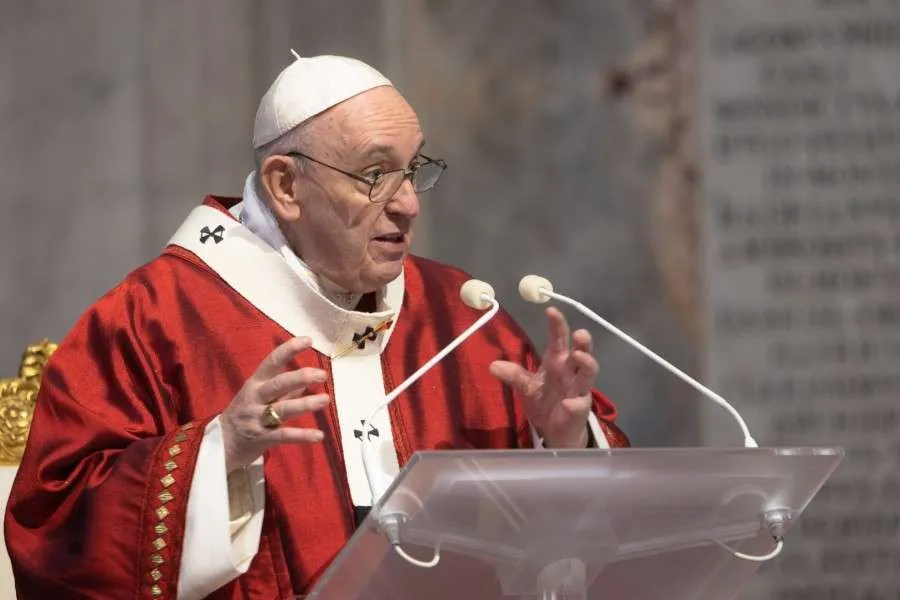Vatican City, 31 May, 2020 / 11:15 am (ACI Africa).
Here is the full text of Pope Francis' Pentecost Sunday homily, delivered May 31, 2020, at the Basilica of St. Peter, and checked against delivery.
“There are different kinds of spiritual gifts, but the same Spirit” (1 Corinthians 12:4), as the Apostle Paul writes to the Corinthians. He continues: “There are different forms of service, but the same Lord; there are different workings but the same God who produces all of them in everyone” (vv. 5- 6). Diversity and unity: St. Paul puts together two words that seem contradictory. He wants to tell us that the Holy Spirit is the one who brings together the many; and that the Church was born this way: we are all different, yet united by the same Holy Spirit.
Let us go back to the origin of the Church, to the day of Pentecost. Let us look at the Apostles: some of them were fishermen, simple people accustomed to living by the work of their hands, but there were also others, like Matthew, who was an educated tax collector. They were from different backgrounds and social contexts, and they had Hebrew and Greek names. In terms of character, some were meek and others were excitable; they all had different ideas and sensibilities. They were all different. Jesus did not change them; he did not make them into a set of pre-packaged models. He left their differences and now he unites them by anointing them with the Holy Spirit. The union comes with the anointing. At Pentecost, the Apostles understand the unifying power of the Spirit. They see it with their own eyes when everyone, though speaking in different languages, comes together as one people: the people of God, shaped by the Spirit, who weaves unity from diversity and bestows harmony because there is harmony in the Spirit. He himself is harmony.
Let us now focus on ourselves, the Church of today. We can ask ourselves: “What is it that unites us, what is the basis of our unity?” We too have our differences, for example: of opinions, choices, sensibilities. But the temptation is always fiercely to defend our ideas, believing them to be good for everybody and agreeing only with those who think as we do. And that's a bad temptation that divides. But this is a faith created in our own image; it is not what the Spirit wants. We might think that what unite us are our beliefs and our morality. But there is much more: our principle of unity is the Holy Spirit. He reminds us that first of all we are God’s beloved children, all the same, in this, and all different. The Spirit comes to us, in our differences and difficulties, to tell us that we have one Lord -- Jesus -- and one Father, and that for this reason we are brothers and sisters! Let us begin anew from here; let us look at the Church with the eyes of the Spirit and not as the world does. The world sees us only as on the right or left, with this ideology, with that one; the Spirit sees us as sons and daughters of the Father and brothers and sisters of Jesus. The world sees conservatives and progressives; the Spirit sees children of God. A worldly gaze sees structures to be made more efficient; a spiritual gaze sees brothers and sisters pleading for mercy. The Spirit loves us and knows everyone’s place in the grand scheme of things: for him, we are not bits of confetti blown about by the wind, rather we are irreplaceable fragments in his mosaic.
If we go back to the day of Pentecost, we discover that the first task of the Church is proclamation. Yet we see that the Apostles do not prepare a strategy; when they were shut in there, in the Upper Room, they did not make a strategy, no, they do not prepare a pastoral plan. They could have divided people into groups according to their roots, speaking first to those close by and then to those far away... They could have also waited a while before beginning their preaching in order to understand more deeply the teachings of Jesus, so as to avoid risks... No. The Spirit does not want the memory of the Master to be cultivated in small groups locked in upper rooms where it is easy to “nest.” And this is a bad disease that can come to the Church: the Church not as a community, not as a family, not as a mother, but as a nest. He opens doors and pushes us to press beyond what has already been said and done, beyond the precincts of a timid and wary faith. In the world, unless there is tight organization and a clear strategy, things fall apart. In the Church, however, the Spirit guarantees unity to those who proclaim the message. The Apostles set off: unprepared, yet putting their lives on the line. One thing kept them going: the desire to give what they received. The beginning of the First Letter of John is beautiful: “What we have seen and heard we proclaim now to you” (1 John 1:3).






